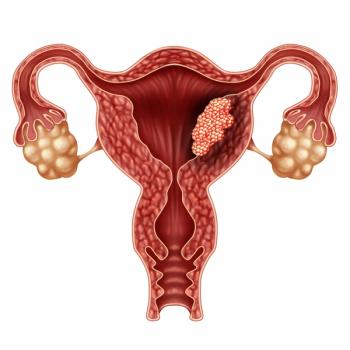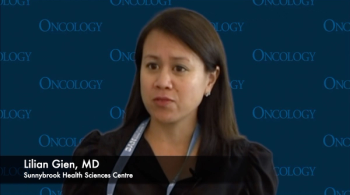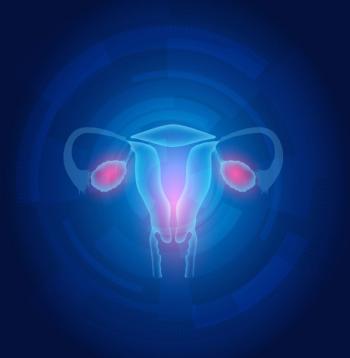
Treatment with tisotumab vedotin may be a standard of care in second- or third-line recurrent or metastatic cervical cancer, says Brian Slomovitz, MD, MS, FACOG.

Your AI-Trained Oncology Knowledge Connection!


Treatment with tisotumab vedotin may be a standard of care in second- or third-line recurrent or metastatic cervical cancer, says Brian Slomovitz, MD, MS, FACOG.

Significant progression-free survival was seen in those with TP53 wild-type advanced/recurrent endometrial cancer who were treated with maintenance selinexor.

Domenica Lorusso, MD, PhD, says that paying attention to the quality of chemoradiotherapy is imperative to feeling confident about the potential addition of pembrolizumab for locally advanced cervical cancer.

Investigators report a trend in overall survival improvement among patients with advanced/recurrent endometrial cancer treated with atezolizumab and chemotherapy.

Future analyses will look at durvalumab/olaparib for endometrial cancer populations with TP53 and POLE alterations, as well as those with estrogen receptor and progesterone receptor positivity.

Data from the phase 2 DESTINY-PanTumor02 trial support trastuzumab deruxtecan as a potential treatment for patients with gynecologic HER2-expressing tumors that have progressed on prior therapy.

Patients with mismatch repair proficient, newly diagnosed, advanced or recurrent endometrial cancer may have enhanced benefit with the addition of olaparib to durvalumab.

Results from the phase 3 GCIG INTERLACE trial highlight progression-free survival and overall survival improvements with induction chemotherapy plus chemoradiotherapy for patients with locally advanced cervical cancer.

The progression-free survival benefit of dostarlimab and chemotherapy extends to those with mismatch repair deficient or microsatellite instability–high advanced endometrial cancer.

Radical hysterectomies result in worse symptom experience, body image, menopausal symptoms, sexual worry, sex activity and enjoyment compared with simple hysterectomy in those with early-stage cervical cancer.

Progression-free survival benefit appears consistent in patients with recurrent or metastatic cervical cancer treated with tisotumab vedotin.

Combining atezolizumab with bevacizumab and chemotherapy may be a new frontline therapy option for patients with metastatic, persistent or recurrent cervical cancer, says Ana Oaknin, MD, PhD.

Investigators report that loss of MMR mechanism is not predictive of response to chemotherapy or pembrolizumab in patients with stage III or IVA, stage IVB, or recurrent endometrial cancer.

Data from the phase 3 KEYNOTE-A18 study may support pembrolizumab plus chemoradiotherapy as a new standard of care for those with newly diagnosed, high-risk, locally advanced cervical cancer.

Durvalumab plus olaparib, durvalumab monotherapy, or chemotherapy plus durvalumab saw an improvement in progression-free survival for patients with newly diagnosed advanced or recurrent endometrial cancer.

Results from phase 1 of the RAMP 201 study shows efficacy in treating patients with recurrent low-grade serous ovarian cancer with avutometinib plus defactinib, regardless of previous treatment.

At 2022 IGCS, Ursula A. Matulonis, MD, spoke about the toxicity profile observed with mirvetuximab soravtansine monotherapy in patients with folate receptor α–high platinum-resistant ovarian cancer reported from the phase 3 SORAYA study.

Ursula A. Matulonis, MD, spoke about the updated results of the phase 3 SORAYA trial with mirvetuximab soravtansine in patients with folate receptor α–high platinum-resistant ovarian cancer presented at 2022 IGCS.

Lillian Gien, MD, spoke about continued use of immunotherapy in patients with recurrent clear cell carcinoma of the ovary following results of a trial examining pembrolizumab plus epacadostat.

Ursula A. Matulonis, MD, spoke about the motivation behind the phase 3 SORAYA trial investigating mirvetuximab soravtansine in patients with folate receptor α–high platinum-resistant ovarian cancer.

At 2022 IGCS, Lilian Gien, MD, spoke about a phase 2 trial which analyzed pembrolizumab plus epacadostat in patients with recurrent clear cell carcinoma of the ovary.

Tiffany Sia, MD, spoke about major takeaways from her study and how to implement procedural interventions for patients with gynecologic malignancies who have oligoprogression.

Results from a phase 2 trial indicated that atezolizumab and bevacizumab yielded a significant duration of response in recurrent endometrial cancer.

Despite inconclusive efficacy results regarding the use of pembrolizumab plus epacadostat in patients with recurrent clear cell ovarian carcinoma, rapid accrual to the trial reveals an unmet need in this cancer subset.

Data from the phase 3 ATHENA-MONO study indicated that maintenance rucaparib yielded progression-free survival benefit vs placebo across all subgroups in a population of patients newly diagnosed ovarian cancer, according to David O’Malley, MD.

Patient-reported outcome data from the phase 3b OReO/ENGOT-ov38 trial showed no significant effect on quality of life following rechallenge with maintenance olaparib in patients with platinum-sensitive relapsed ovarian cancer.

At 2022 IGCS, Tiffany Sia, MD, spoke about using procedural interventions to treat patients with gynecologic malignancies who have oligoprogression on treatment with immune checkpoint inhibitors.

Results from the phase 3 ATHENA-MONO study suggest that rucaparib could serve as a promising first-line maintenance treatment option in newly diagnosed ovarian cancer.

Patients with mismatch repair deficient, microsatellite instability–high advanced/recurrent endometrial cancer may derive benefit from treatment with dostarlimab-gxly.

Results from the phase 3 CALLA trial indicated that durvalumab in combination with chemoradiotherapy did not yield a meaningful improvement in progression-free survival compared with chemoradiotherapy alone in high-risk locally advanced cervical cancer.